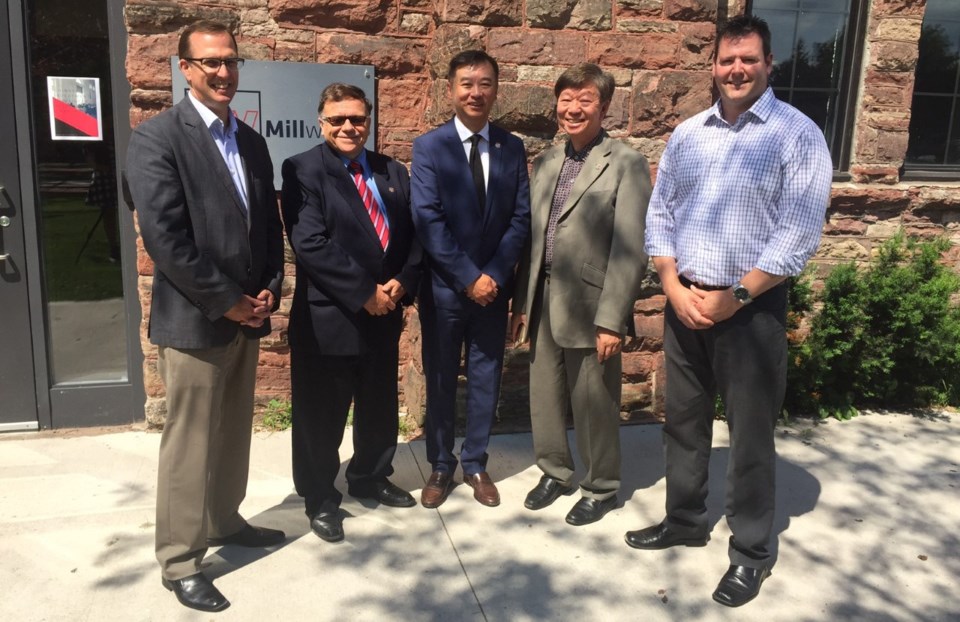Half a mile from Canada's border with his rival superpower, the visiting trade representative made himself perfectly clear.
The People's Republic of China is setting out to create a new world order.
A new economic order less dependent on the United States and Western Europe.
An economy centred instead on China and more than 60 nearby trading-partner nations in Asia, the Middle East and Eastern Europe.
China, we were told, wants the Ontario Sault's business community to help make this happen.
"They're trying to change the world order, because as we know now it's owned by the U.S. and Europe," said Johnny So, president of the Chinese Investment and Business Alliance of Canada (CIBAC). "They want to join the economic powers using their technology," So said.
So was speaking last week at the Millworks Centre for Entrepreneurship to a group of local business leaders assembled by the Sault Ste. Marie Economic Development Corp.
CIBAC is a non-profit, semi-official government organization that describes itself as "aiming to help Canadian businesses create international corporate synergy with businesses from Mainland China and Hong Kong."
Much of the discussion at last week's meeting dealt with China's Belt and Road initiative, a trillion-dollar infrastructure project intended to recreate the country's ancient Silk Road trade routes connecting east and west.
The behemothic endeavour will carve out new transportation and trade corridors to places like Russia, Eastern Europe, Turkey, Singapore, Myanmar and Pakistan.
Over thirty years, China is planning to open the floodgates of its trade, capital and services to 65 other countries comprising an area twice its current size.
So was accompanied on his Sault visit by Joseph Kan, Guangdong economic and trade representative officer in Canada; Winnie Yu Wong, president of CIBAC's women entrepreneur division; and Alan Ballak, CIBAC vice president government liaison and global communication.
Ballak is a former Saultite and a former federal trade commissioner.
Last week's gathering took place at Ballak's initiative after he identified numerous Northern Ontario products appropriate for export to the world's most populous nation, as well as opportunities for Chinese investment here in Algoma.
"The Chinese are going head-to-head with the Americans to try to get more trade," Ballak said.
"Every country wants to do the best for who they are," Joseph Kan told SooToday. "You don't take a small country with a little GDP (gross domestic product) to compete. You pick the giant."
"If you ask me....They have to protect themselves," Kan said. "In the First World War and the Second World War, China suffered a lot. So now they've learned something. They have to be strong."
"When you're weak, they come after you. When you're strong nobody will touch you," Kan said.
Even though they're clearly itching to eat America's lunch, members of the visiting trade delegation saw many opportunities to do business with Northern Ontario.
After years of lax environmental oversight, China's now going green, they said.
They're interested in natural products like maple syrup and investing in renewable energy technologies like solar and wind farms.
Other interests include ice wine, ginseng, log homes and high-speed rail technology.
And chicken feet.
China really, really, really wants to buy chicken feet from us, So said.
Chicken feet are widely enjoyed in dim sum restaurants.
"It's part of the chicken. Still tastes good."
So said he has one buyer looking to buy 500 containers of chicken feet every month.
The buyer won't look at anything less than 100 containers a month.
"As long as this factory is approved by customs, there's huge business there," So said.
What about predictions that India's fast-growing population will surpass China's by 2024 to become the planet's biggest market?
Kan pointed out that China changed its one-child-per-family policy last year.
With two children now allowed, the country is enjoying a significant baby boom.
India and China are both large markets in close proximity to each other, Kan said.
"If you go to China, you can go to India in about an hour," he said.
The visitors invited Sault business people to join a Canadian trade mission to Hong Kong next month.
